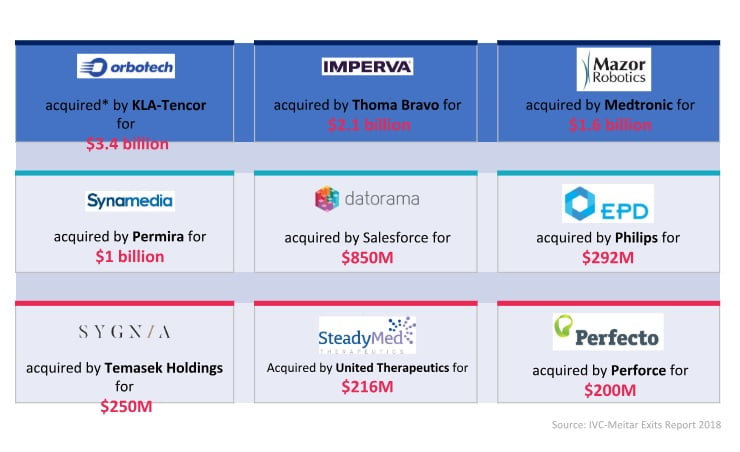Israeli companies exited for $12.63 billion in 103 deals in 2018, down almost half from $23 billion in 112 deals in 2017, according to a new joint report by the IVC research center and the Meitar Liquornik Geva Leshem Tal & Co. law firm.
The total exit value for 2018 include four “mega-deals” of $1 billion or more each. The “mega-deals” include the acquisitions of Orbotech by KLA-Tencor for $3.4 billion, Imperva by Thoma Bravo for $2.1 billion, Mazor Robotics by Medtronic for $1.6 billion, and SynaMedia (formerly NDS) by Permira for $1 billion. (Permira bought back part of TV software solutions company NDS from American tech giant Cisco, which had acquired the Jerusalem-based video and security specialist for $5 billion in 2012.)
These four deals account for some 65 percent of the total exit value for 2018. Without these deals, exits in 2018 totaled $4.5 billion — the lowest since 2014, according to the report, which also did not include the high profile (but non-tech) acquisitions of Frutarom by IFF for $7.1 billion and SodaStream by Pepsico for $3.2 billion.
SEE ALSO: Capital Raised In 2018 By Israeli Companies Reaches Record Levels, But Exits Drop
The report covers IPOs, M&A (mergers and acquisitions) and private-equity buyouts over the course of 2018, and shows a significant decrease of 20 percent in M&As, the most common form of exits in Israel. The number of such transactions decreased from 111 to 89 in 2018, the report shows.

Top exits in 2018, according to an IVC-Meitar report.
There was also a decrease in the number of total deals to 103 in 2018, down from 133 in 2017. According to the report, this is due to a drop in the number of M&A deals of $20 million and below.
Shira Azran, a partner at Meitar Liquornik Geva Leshem Tal & Co.,says this is because of a certain maturity in the high-tech industry corresponding with larger-scale investments in growth companies.
A report by IVC and ZAG S&W Zysman, Aharoni, Gayer & Co earlier this month showed that Israeli companies and startups raised a record $6.47 billion in 623 deals in 2018, with 100 companies raising more than $20 million each for a total sum of $4.1 billion, four times more compared to 2013. Meanwhile, the number of companies that raised $30 million or more also increased significantly, from 41 in 2017 to 62 in 2018.
“This combination of a significant increase in the volume of investments in growth companies and a relative stagnation in exits value, highlights the fact that Israel is building a strong and significant infrastructure of companies that in the coming years will examine their ability to reach an exit that reflects a significant return to investors,” Azrain said.
Benzi Segev, CEO of IVC Research Center, said “the Israeli startup landscape in 2018 took another step in the global direction of more money funneled into [fewer] deals.”
Sign up for our free weekly newsletter
Subscribe“This pattern was noted on both sides of the tech deal activity — M&A and funding. Looking 12 to 18 months ahead, the fundamentals for long term growth already exist — amounts and numbers of large investments are on the rise, but it remains to be seen if the local scene could use these resources to grow,” he added.
Also on a downtrend in 2018 was the number of deals not backed by venture capital, down to 50 this past year compared to 75 in 2017 – a drop of 58 percent, and the lowest in five years.
According to the IVC-Meitar report, in 2018 there were “34 VC-backed companies reaching an exit after more than five years of activity, similar to the level in the last five years for VC-backed exits. However, the number of non-VC-backed companies that reached an exit in less than five years since establishment decreased nearly 60 percent in 2018, to only 15, compared to 34 and 36 in 2016 and 2017, respectively.”
According to the report, the most active sector for exits, like previous years, is the life sciences industry, with 24 deals including seven IPOs in 2018. The number of deals in the IT & software sector rose to $4.49 billion in 2018 from $3.31 billion in 2017
Exit values for AI companies and startups, meanwhile, spiked in 2018 to $1.15 billion, due mainly to the acquisition deal by San Francisco-based cloud computing company Salesforce for Israeli company Datorama deal for a reported $850 million. The figure is almost four times higher than 2017’s $307 million for such companies.
Exit values for cybersecurity companies reached a record $2.81 billion in 12 deals, compared to $1.35 billion in 14 deals in 2017.
Foreign and Israeli buyers
American and Israeli firms still made up the majority of buyers, according to the report, even as there’s been a sharp decrease in the number of acquisitions of Israeli companies by Israeli buyers in 2018. Just 21 such transactions were recorded for the year, down from 38 in 2017, according to the report.
In 2018, 78 percent of buyers were American companies, up from 43 percent in 2017. “Chinese acquirers are not yet significant players,” the report reads, showing just one percents of deals in 2018 were with a Chinese entity, down from three percent in 2017.
Related posts

Editors’ & Readers’ Choice: 10 Favorite NoCamels Articles

Forward Facing: What Does The Future Hold For Israeli High-Tech?

Impact Innovation: Israeli Startups That Could Shape Our Future




Facebook comments